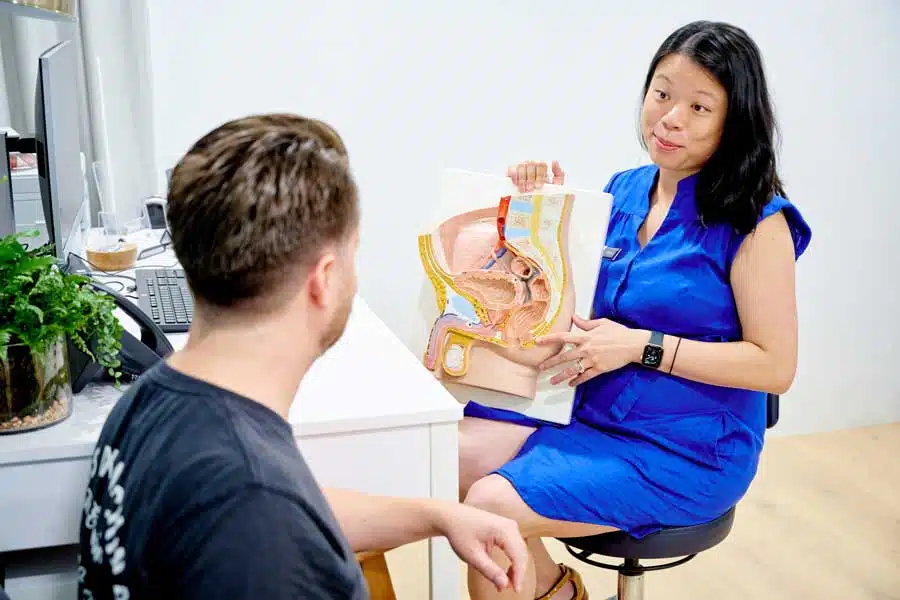This article is all about how to cultivate wellbeing in the post-natal period. As my third baby, Charlotte, turns 6 months old, I’m starting to emerge from that bubble of broken nights, breastfeeding and babywearing, and am feeling inspired to talk about how we can best take care of ourselves during this intense but incredible period of our lives. So with my Physio and yoga hats firmly on, and through the not-too-foggy lens of a new mum, here are some tips and reflections on how to take care of ourselves, body and mind, in those early days with baby.
Best Regards,
Felicity De Blic.
Get Educated And Know Your Body
Prenatally there are so many resources out there to support you as you head towards birthing baby AND beyond. At Sydney Pelvic Clinic, prenatal exercises classes, 1:1 birth preparation sessions, and our complimentary ‘After Birth’ online talk are great ways to help you prepare body and mind for the journey ahead. Chat honestly with other mums about what has been tricky, what habits and routines they found helpful, and which services they’ve accessed for themselves and for baby.
We all know we should see our GP for a 6-week check after baby is born. But don’t forget to have a Physio check around the 6-week mark as well, or even before if you have issues or concerns. After the incredible changes to your body during 40 weeks of pregnancy, the physical toll of birth, and the dramatic shift back to having no baby inside you, it makes good sense that your body – especially your abdominals and pelvic floor – need to be assessed.
This means you will have knowledge about what’s happening in your body after your birth experience, how to correctly engage the pelvic floor and abdominals as suited to how your body is presenting, and get advice on safely returning to your preferred exercise routines. Knowledge is empowering, and it helps you feel back in control after the rollercoaster of pregnancy and birth.
Breastfeeding Is Amazing, But Boobs Can Hurt!
Breastfeeding has been an amazing journey for me with all three of my kiddos. But not at all easy! No one ever told me that breastfeeding can be very difficult in the early days. It’s great to learn about breastfeeding and how to help baby get a good latch before birth. But even if you know everything there is to know, your baby will have their own little habits and preferences, as well as physical traits like tongue ties that can impact feeding. If you have any difficulties, track down a lactation consultant through your hospital, child and family health centre or a private lactation consultant that can come to your home. They are wonderful professionals that provide amazing ongoing support throughout this journey.
Blocked ducts and mastitis are common in the early months of establishing your milk supply, and Physiotherapy can be very helpful with the use of ultrasound, massage and advice to help manage pain and clear blockages. Getting on top of it early can save you days of pain and difficulty, so don’t hesitate to get in touch with our clinic for breast pain support.
But… also know, that in the intimate feeding relationship between mother and baby, only you know what is going to work best for both of you, and your family. Seek support, but make the decisions you need to make without judgement. Breast or bottle, a fed baby is best.

Get Out Of The House
Since we’ve all just come out of lockdown, I’ll include this tip! But in all seriousness, fresh air, natural light and exercise will help you meet the challenges of the newborn days. And it doesn’t have to be a big trip with a fully packed nappy bag, which can sometimes feel daunting. Even just wandering out the front door and up and down the street a few times with baby in the carrier or on your own can be all you need to reset.
Exercise
Whether it be a pram-pushing walk, our online Physio-led Mums n Bubs exercise class or some living room yoga after baby is in bed, incorporating movement into your weekly, if not daily routine, is a must. You will know how to correctly engage and strengthen your pelvic floor and abdominals after your 6-week check, and joining our Mums n Bubs classes will help to build your repertoire of safe and specific exercises to help you recover and thrive.
Moving your body in safe and healthy ways after baby is born will not only support your physical recovery, but just as importantly, support good mental health. Being active in the early days can decrease the risk of developing post-natal depression, and exercise is also an effective treatment strategy. Pick what works for you, and, even if you’re tired, try and move a little every day. Amazingly, moderate exercise usually makes you feel less tired! If symptoms of pain, weakness or incontinence are getting in the way of exercising, then seek help early, to remove any barriers to getting moving.
Stretch, Breathe and Meditate
You may not feel like you have any moments to yourself. Having an uninterrupted shower can seem like a luxury! But sneaking in little rituals to your day for self-care can make a huge difference to how you feel, and how your body copes with your new routines of feeding, carrying, pram pushing and rocking. Try lying down on the floor next to your baby on their playmat and stretch – wherever you feel your body needs it.
Practice slow diaphragmatic breathing while you feed or settle baby – it will calm you, and help calm them too. Learn walking meditation… you’ll be doing a fair amount of pacing around the house, so making this into a mindfulness practice is a great way to stay present and calm. When baby settles to sleep, why not press play on a recorded meditation or relaxation (I’ve included one below just for you!). Even if baby wakes 10 minutes later, you’ve managed some moments for self-care.
Sleep
Don’t laugh. I know sleep will be hard. Sleep is still elusive in our house and the three-year-old is more to blame than his baby sister! But there are ways to get more sleep. And if you are having a rough time, physically or mentally, every little bit counts. Whether you can feed lying down, co-sleep, nap when baby naps, get your partner or friend to take baby for a walk while you shower and rest, or do the morning shift while you sleep in an extra hour or two… do whatever it takes to get that little bit more. It might not feel like that big block of sleep you are craving, but it will make a difference to how you feel.
Advantages Of Physiotherapy
I know I am biased, but I feel truly blessed to be part of the Physiotherapy profession, and to have had my wonderful colleagues on hand to help me prepare for and recover from one of the most incredible things the female body is capable of. No other health profession assesses and treats muscles to restore function like Physios do.
One of the things I’m most grateful for is the treatment I had following my second birth where I sustained birth injuries. Having appropriate management gave me the confidence to go for baby number 3, and the 1:1 birth preparation sessions helped prepare my body, and empowered me to go into my delivery with knowledge, not fear.
Mental Health Concerns? Reach Out
In Australia, 1 in 6 women will experience post-natal depression or anxiety. The identity shift of becoming a new mum, the responsibility of caring for a baby, the changes in your relationship with your partner, the sleep deprivation… all of these things and so many more challenge our mental health. On an average day we can experience a wide range emotions, with a rollercoaster of intensities.
But when the bad days start adding up, find compassion for your experience of motherhood, and reach out for support. There are excellent helplines, forums and online programs out there (I’ve listed a few excellent ones below), and a mental health plan from your GP can help you access psychology sessions.
Handy Links
The key to wellbeing in the post-natal period, is to take care of yourself, and to let others take care of you. Accessing services for YOUR health, not just for baby. Take moments every day, even tiny ones, to fill up your cup, and if they haven’t asked yet, let your loved ones know how they might help you. These moments to recharge and reconnect with yourself will serve you well, and help bring more ease and joy into this transition to motherhood.

